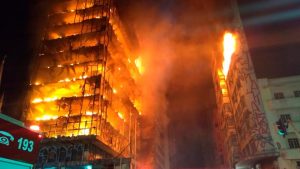When he first heard the expression for tall city buildings, he imagined they actually scraped the sky. In his childhood imagination he saw the final bricks—for he was used to building with interlocking blocks—fastened to the top and the last row  brushing against the blue fabric of the universe. The sky would be scored in a long trail, which he imagined to resemble a black cloud, and the blue cloth that made up the sky would tumble down and be collected by those who lived in the city. They would make clothes from the cloth and wherever they traveled they would be recognized, the colour becoming their national dress.
brushing against the blue fabric of the universe. The sky would be scored in a long trail, which he imagined to resemble a black cloud, and the blue cloth that made up the sky would tumble down and be collected by those who lived in the city. They would make clothes from the cloth and wherever they traveled they would be recognized, the colour becoming their national dress.
Because he  didn’t think he was lying, or even telling stories, he explained the inner workings of his world to other kids in school. They would rock on their heels, fascinated that such magic lay just beyond their hands, and for the rest of the day they would examine the downtown buildings for their tendency to peel back the fabric of existence. When they told the teacher, the stories ground to a halt, however.
didn’t think he was lying, or even telling stories, he explained the inner workings of his world to other kids in school. They would rock on their heels, fascinated that such magic lay just beyond their hands, and for the rest of the day they would examine the downtown buildings for their tendency to peel back the fabric of existence. When they told the teacher, the stories ground to a halt, however.
He was taken aside and asked what he’d been saying, and when he confessed to the stories, they chastised him and said they would tell his parents. He wasn’t so much frightened by the prospect that his parents would be involved as he was the notion that he’d been wrong. He asked about  skyscrapers and was told that they were merely tall buildings. Rather like Greenland was named for Icelandic misinformation—a kind of early false advertising—skyscrapers didn’t scrape the sky so much as they interfered with birds. Because they didn’t want the children worrying about birds, they went after something much closer to the Tower of Babel. The skyscrapers interfered with the sky itself, and people would stand in the street and stare upwards at the monstrous buildings allowed by physics, engineering and human pride.
skyscrapers and was told that they were merely tall buildings. Rather like Greenland was named for Icelandic misinformation—a kind of early false advertising—skyscrapers didn’t scrape the sky so much as they interfered with birds. Because they didn’t want the children worrying about birds, they went after something much closer to the Tower of Babel. The skyscrapers interfered with the sky itself, and people would stand in the street and stare upwards at the monstrous buildings allowed by physics, engineering and human pride.
As he grew older he lost both his fascination with the word as well as his respect for tall buildings. As far as he was concerned, they were just a way that the modern world wasted resources. The argument about building up instead of sideways, as a form of urban planning, was merely a cover for architectural marvels and testing the limits of human achievement. The end result was no more interesting than a termite mound.  The newer and higher the skyscraper, the more his derision, and he’d even lost a job because he wouldn’t stop complaining about the building where they worked. The two tiered elevators were barely functional, he claimed, the building a firetrap in the case of an emergency, and the re-circulated air toxic with the outgassing from a hundred different foul-mouthed residents, as well as the many cleaning compounds and plastics used in the furnishings.
The newer and higher the skyscraper, the more his derision, and he’d even lost a job because he wouldn’t stop complaining about the building where they worked. The two tiered elevators were barely functional, he claimed, the building a firetrap in the case of an emergency, and the re-circulated air toxic with the outgassing from a hundred different foul-mouthed residents, as well as the many cleaning compounds and plastics used in the furnishings.
As if he were still in school, he was called into his supervisor’s office and asked about his animosity, but he had difficulty articulating his extreme distaste for a building that only existed so that people who were depressed might find an easily accessible escape route. “I have no respect for this type of building,” he’d started to explain.
“I don’t care.” His supervisor looked out the window and sighed. “That’s about it, really. I just don’t give a damn whether you like this building or not. This is where our company has chosen to locate. I didn’t make the decision, nor  did any of the people you have complained to in the elevator. There is nothing we can do about it, and if you want to keep this job, you’ll stop telling your coworkers that buildings like this only exist to show off the architect’s erection, that they are suicide traps, or that they use more resources than they save.”
did any of the people you have complained to in the elevator. There is nothing we can do about it, and if you want to keep this job, you’ll stop telling your coworkers that buildings like this only exist to show off the architect’s erection, that they are suicide traps, or that they use more resources than they save.”
“They do.”
“No one cares. We have to work here. And if you don’t learn to put up with that, to face the cold hard reality of this building, then you won’t have that same worry.”
His boss had been explicit enough, and that should have sufficed. Instead, like many  condemnations from the top, it merely drove the problem underground. He began to watch city disaster movies which involved buildings, and to forward memes which featured tall buildings being destroyed or even defaced. He had to get clever, he convinced himself, so he began to bring in rice with a single stalk of celery. He would stand the celery upright in the rice and nibble around the edges until the celery was eroded into strands like dental floss lying in a heap on the spongy rice. The people were like the grains of rice, he told his coworkers. They were weak and soft, and the collapsing building had crushed them like teeth.
condemnations from the top, it merely drove the problem underground. He began to watch city disaster movies which involved buildings, and to forward memes which featured tall buildings being destroyed or even defaced. He had to get clever, he convinced himself, so he began to bring in rice with a single stalk of celery. He would stand the celery upright in the rice and nibble around the edges until the celery was eroded into strands like dental floss lying in a heap on the spongy rice. The people were like the grains of rice, he told his coworkers. They were weak and soft, and the collapsing building had crushed them like teeth.
Sadly, he needed his job, but he couldn’t seem to help himself. When he was called into the office again, his supervisor was even clearer. “I may have to let you go. What is it now, two written, and one formal verbal warning? And that’s after a dozen complaints and several honourable mentions. You’re out of hand.”
He was ready for him. “Trauma.”
“What?” The sinking look on the supervisor’s face told him he was on the right track.
“Maybe I should talk to HR. Get counseling. PTSD.”
His boss’ tone changed. “You’re responding to a traumatic incident?” His feet moved under the desk.
The air shifted. His eyes sought the floor in assumed shame. “I blame myself. I should have known it would resurface working in such a building. If I had known it would prove to be so difficult for my coworkers I wouldn’t have taken the job.” He risked a look.
“This is perhaps a conversation you should have with counseling services. I’m not trained.” The supervisor moved in his seat and his eyes were glued on the view.
“You’re right. I need to get help.” He stood up and saluted. “It’s not exactly like it’s the twin towers anyway.”
He’d learned in school to keep his touch light.
“Oh,” his supervisor glanced at him and quickly away. “I’ll make a call.”
Although the rest of the time he worked for that company he was treated like an invalid, he was able to say what he wanted about tall buildings. Somehow, however, that took a lot of the joy out of it. No longer were people listening to his arguments. Instead, they either focused on where they thought the arguments were coming from, or picked through his complaints as though they would be able to tell what his connection to the twin towers was.
Any more logical arguments against skyscrapers were as ephemeral as the dream he’d had a child about a blue-clothed people who lived near a torn sky. Gradually, even with HR, he learned to speak of different matters, and his coworkers sighed in relief that they’d saved another trauma victim by ignoring what they had to say.
